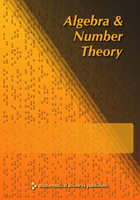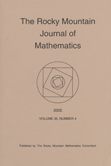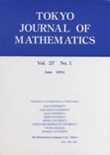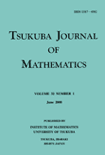
Research in Number Theory
Scope & Guideline
Illuminating the path to understanding complex numerical concepts.
Introduction
Aims and Scopes
- Algebraic Number Theory:
The journal publishes research on algebraic structures, including fields, rings, and modules, particularly in relation to Galois theory, class numbers, and the distribution of primes. - Modular Forms and Functions:
A significant focus is on modular forms, their properties, and applications, including their connections to elliptic curves, L-functions, and automorphic representations. - Diophantine Equations:
Research related to solving Diophantine equations, including techniques and conjectures related to integer solutions and their geometric interpretations. - Arithmetic Geometry:
The journal covers topics at the intersection of algebraic geometry and number theory, including rational points on varieties, modular curves, and their implications. - Analytic Number Theory:
Analytical approaches to number theory are explored, including the study of zeta functions, prime number distributions, and asymptotic analysis. - p-adic Analysis:
Research on p-adic numbers and their applications in number theory, particularly in understanding congruences and modular forms. - Combinatorial and Probabilistic Number Theory:
The journal also includes studies that apply combinatorial techniques and probabilistic models to classical problems in number theory.
Trending and Emerging
- Connections Between Number Theory and Cryptography:
An increasing number of papers explore the intersection of number theory with cryptographic applications, particularly in relation to elliptic curves and modular forms, reflecting the importance of secure communications. - Applications of Modular Forms in Physics:
There is a notable trend in the application of modular forms to problems in theoretical physics, particularly in string theory and quantum field theory, showcasing the interdisciplinary nature of modern number theory. - Higher-dimensional Geometry and Number Theory:
Research exploring the connections between higher-dimensional algebraic geometry and number theory is on the rise, indicating a growing interest in understanding the geometric aspects of number-theoretic problems. - Theoretical Advances in L-functions:
Papers focusing on new results and conjectures regarding L-functions, including their properties and implications for number theory, are becoming increasingly prominent. - p-adic Dynamics:
The study of p-adic dynamics and its implications for number theory is emerging as a significant area, reflecting a deeper investigation into the behavior of numbers under various operations.
Declining or Waning
- Elementary Number Theory:
There has been a noticeable reduction in papers focusing on classical elementary number theory topics, such as basic divisibility properties and simple congruences, as researchers increasingly engage with more complex and abstract areas. - Historical Aspects of Number Theory:
Research exploring the historical development of number theory concepts or biographies of significant mathematicians has diminished, indicating a trend towards contemporary applications and theoretical advancements. - Computational Number Theory:
The number of papers dedicated to computational methods in number theory has decreased, possibly reflecting a shift towards theoretical research rather than algorithmic or computational explorations.
Similar Journals

Algebra & Number Theory
Fostering Excellence in Algebra and Number Theory ResearchAlgebra & Number Theory, published by Mathematical Science Publications, stands at the forefront of mathematical research, particularly in the fields of algebra and number theory. With an ISSN of 1937-0652 and E-ISSN 1944-7833, this esteemed journal provides a dedicated platform for the dissemination of cutting-edge theoretical advances and practical applications. It has achieved a Q1 category ranking in both algebra and number theory according to the 2023 quartiles, reinforcing its critical role in shaping contemporary mathematical discourse. The journal serves as an essential resource for researchers, professionals, and students alike, offering insights into diverse mathematical methodologies and fostering open dialogue among scholars. Although it does not provide open access, its robust impact factor reflects the high quality and relevance of its published work. Based in the United States at the University of California, Berkeley, the journal's commitment to excellence continues to attract contributions that push the boundaries of mathematical understanding.

Discrete Analysis
Bridging Theory and Application in MathematicsDiscrete Analysis, published by ALLIANCE DIAMOND OPEN ACCESS JOURNALS, is a pioneering open access journal that has been contributing to the fields of Algebra, Number Theory, Discrete Mathematics, Combinatorics, Geometry, and Topology since its inception in 2016. Based in the United Kingdom, this journal is highly regarded, holding a prestigious Q1 ranking across key mathematical disciplines as of 2023, which underscores its influence and reputation within the academic community. With rigorous peer-review standards and an accessible platform, Discrete Analysis is dedicated to disseminating high-quality research that fosters advancements in mathematical theory and application. By embracing the open access model, the journal ensures that scholarly work is readily available to researchers, professionals, and students alike, promoting greater collaboration and innovation in mathematical research. For up-to-date insights and contributions in the field, Discrete Analysis is an essential resource.

ROCKY MOUNTAIN JOURNAL OF MATHEMATICS
Fostering Collaboration in Diverse Mathematical FieldsROCKY MOUNTAIN JOURNAL OF MATHEMATICS, published by the Rocky Mountain Math Consortium, serves as a critical platform for researchers and practitioners in the field of mathematics since its inception in 1971. With a notable presence in the academic community, this journal covers a broad spectrum of mathematical disciplines, positioning itself in the Q2 category for Mathematics (miscellaneous) as of 2023. Despite being a subscription-based journal, it is recognized for its rigorous peer-review process and contributions to theoretical and applied mathematics, helping to advance knowledge and foster collaboration among mathematicians. The journal's ISSN number is 0035-7596 and its E-ISSN is 1945-3795, reflecting its commitment to accessibility and dissemination of high-quality research. Based in Tempe, Arizona, at Arizona State University, the journal continues to play an important role in shaping contemporary mathematical discourse through well-researched articles and innovative studies, aiming to bridge gaps between various mathematical subfields and engage a diverse audience, including students and established researchers alike.

ACTA ARITHMETICA
Showcasing groundbreaking research in number theory.ACTA ARITHMETICA, published by the Polish Academy of Sciences Institute of Mathematics - IMPAN, serves as a prominent platform for the field of Algebra and Number Theory, showcasing significant advancements and novel research findings. With an ISSN of 0065-1036 and an E-ISSN of 1730-6264, this esteemed journal, based in Warsaw, Poland, has established itself within the academic community since its inception in 1996. Ranking in the Q2 category for Algebra and Number Theory in 2023, and positioned at #78 among 119 peers according to Scopus metrics, ACTA ARITHMETICA is dedicated to disseminating rigorous mathematical research, thereby fostering scholarly dialogue and innovation. Although the journal does not currently offer open access options, its wide readership ensures that research published within its pages reaches a global audience. With a commitment to excellence in mathematical exploration, the journal remains an essential resource for researchers, professionals, and students eager to stay at the forefront of this dynamic field.

Periodica Mathematica Hungarica
Illuminating the Path of Mathematical Discovery.Periodica Mathematica Hungarica is a prestigious academic journal published by Springer, focusing on the field of mathematics, with a particular emphasis on miscellaneous mathematical studies. Established in 1971, this journal has maintained its commitment to advancing mathematical research and its applications, making significant contributions over its converged years through 2024. With a Q2 ranking in the mathematics category as of 2023, it establishes itself as a vital resource within the mathematical community. Researchers and academics will find its inclusion in the Scopus database, ranking #189 out of 399 in general mathematics, indicative of its impact and relevance. Although it does not feature open access, the journal provides a wealth of high-quality peer-reviewed articles, thereby serving as an essential platform for the dissemination of innovative mathematical theories, methodologies, and findings. Engaging with the content of Periodica Mathematica Hungarica is crucial for anyone looking to stay at the forefront of mathematical research and development.

FIBONACCI QUARTERLY
Bridging Theory and Application in MathematicsFibonacci Quarterly is a notable journal published by the Fibonacci Association, focusing on the captivating realms of mathematics and its applications, particularly Algebra and Number Theory. With its ISSN 0015-0517, the journal serves as a vital platform for the dissemination of original research and innovative ideas within its field. Established in the United States and operating since its inception, the journal covers an extensive timeline of contributions from 1996 to 2008 and continues its journey of academic excellence with ongoing publications through 2024. Currently ranked in the Q3 category for Mathematics (Algebra and Number Theory) as of 2023, Fibonacci Quarterly has established itself as an essential resource for researchers and practitioners alike, despite its modest Scopus rank of #91 out of 119 with a 23rd percentile ranking. Although not an open-access journal, it provides crucial insights and advancements that fuel scholarly discussions and foster academic growth in the mathematical community. Whether you are a researcher, a professional, or a student, Fibonacci Quarterly offers a wealth of knowledge that enriches the understanding of number theory and algebra, making it an indispensable resource in the pursuit of mathematical clarity and innovation.

Advances in Group Theory and Applications
Advancing Mathematical Knowledge Through Open AccessAdvances in Group Theory and Applications is a pioneering open-access journal published by AGTA in Italy since 2016, dedicated to disseminating high-quality research in the fields of group theory, algebra, and number theory. With its ISSN 2499-1287, the journal embraces a broad scope that addresses theoretical advancements and practical applications, making it an invaluable resource for researchers, professionals, and students seeking to deepen their understanding and contribute to these mathematical disciplines. As part of its commitment to accessibility, Advances in Group Theory and Applications has been fully open access since its inception, ensuring that innovative research reaches a wide audience without financial barriers. Although it currently holds a Q4 ranking in the category of Algebra and Number Theory, its growing reputation is reflected in an upward trend in citations and an expanding author base. The journal serves as a critical platform for the exchange of ideas, providing a forum for critical discourse and enhancing collaboration among mathematicians worldwide.

Tokyo Journal of Mathematics
Empowering Researchers with Cutting-Edge InsightsTokyo Journal of Mathematics is a prestigious journal dedicated to the dissemination of high-quality research in the field of mathematics. Founded in 1978, this journal serves as a platform for researchers to publish their findings, providing cutting-edge insights into various mathematical theories and applications. Published by the TOKYO JOURNAL MATHEMATICS EDITORIAL OFFICE ACAD CENTER, the journal is based in Japan and forms an integral part of the global mathematical community. Although listed in the Q4 quartile of Mathematics (Miscellaneous) category for 2023, its inclusion in Scopus rankings highlights its ongoing commitment to scholarly excellence. The journal does not currently offer Open Access options, thus providing readers with insightful access to critical advancements in mathematics. With an ISSN of 0387-3870 and a publication history spanning over four decades, the Tokyo Journal of Mathematics remains an essential resource for researchers, professionals, and students alike, fostering the advancement of mathematical knowledge and collaboration across borders.

Tsukuba Journal of Mathematics
Elevating the Discourse in Mathematics for Global ImpactTsukuba Journal of Mathematics is a distinguished publication dedicated to advancing the field of mathematics through the dissemination of innovative research and comprehensive studies. Published by the University of Tsukuba, Department of Mathematics, this journal serves as a vital platform for mathematicians, researchers, and students to engage with cutting-edge mathematical theories and methodologies. Although currently not available as an open-access journal, it maintains a strong academic presence, contributing significantly to the global mathematical landscape. The journal invites submissions across various branches of mathematics, aiming to foster scholarly communication and collaboration. The ISSN 0387-4982 and the E-ISSN 2423-821X further establish its credibility and accessibility among the academic community, supporting its critical objective of facilitating high-quality research output. Situated in Tsukuba, Japan, a hub for scientific research and development, the Tsukuba Journal of Mathematics is committed to bridging gaps in mathematical knowledge and encouraging exploration of novel ideas.

Documenta Mathematica
Pioneering Insights in Mathematics Since 1996Documenta Mathematica is a premier academic journal published by the European Mathematical Society (EMS), making significant contributions to the field of mathematics since its inception. With an Open Access model established in 1996, the journal ensures that scholarly works are freely available to a global audience, promoting widespread dissemination of mathematical research. Based in Germany, it serves as a vital platform for mathematicians, covering a wide array of topics within the discipline, evidenced by its impressive Q1 ranking in the miscellaneous category of mathematics as of 2023. Featuring rigorous peer-reviewed articles that span the latest trends and breakthroughs in the discipline, Documenta Mathematica also retains a commendable position among its peers with a Scopus rank of 163 out of 399, placing it in the 59th percentile for general mathematics. Researchers, professionals, and students alike will benefit from the robust scholarly content and the journal's commitment to advancing mathematical knowledge.